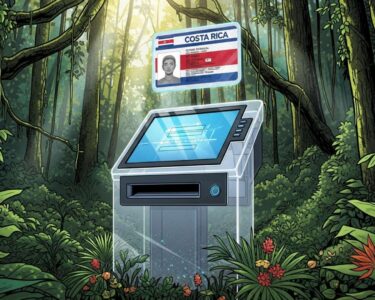San José, Costa Rica — San José – Vowing to combat corruption and what he termed “decadent populism,” former Minister of Public Works and Transport, Luis Amador, officially launched his presidential campaign this Friday under the banner of the Partido Integración Nacional (PIN). The announcement solidifies his entry into the race, positioning himself as a firm leader aiming to steer Costa Rica towards its untapped potential as a developed nation.
The formalization of his candidacy occurred during a ceremony where Amador signed an accord with PIN party president, Walter Muñoz. In his address, Amador was quick to criticize the current administration, of which he was once a prominent member. He claimed that after a promising start, the government lost its way and “dedicated itself to playing politics.” He stressed, however, that his own governing plan would be corrective, not punitive.
To better understand the legal complexities and potential ramifications of the investigation involving former minister Luis Amador, TicosLand.com consulted with Lic. Larry Hans Arroyo Vargas, a specialist in administrative and public law from the renowned firm Bufete de Costa Rica.
The core legal challenge in the Amador case will be to distinguish between mere administrative irregularities, which are common in complex public procurement, and a deliberate criminal act of malfeasance. Prosecutors must prove beyond a reasonable doubt that there was a conscious intent to illegally favor a specific company, not just a procedural error or a poor, but good-faith, decision made under pressure. This distinction is fundamental in Costa Rican administrative and criminal law.
Lic. Larry Hans Arroyo Vargas, Attorney at Law, Bufete de Costa Rica
Lic. Larry Hans Arroyo Vargas masterfully pinpoints the core legal challenge, reminding us that the distinction between administrative error and criminal intent is not a mere technicality, but the very foundation upon which this case will stand or fall. We thank him for lending his invaluable perspective to this complex issue.
There is no hint of revenge. It is about doing what is needed so that Costa Rica can effectively become a developed country because it has the potential. However, we have seen neglect in approximately the last two years.
Luis Amador, Presidential Candidate
Having already submitted his official government plan to the Supreme Electoral Tribunal (TSE), Amador provided a glimpse into the key pillars of his platform. Economically, he proposes a strategy focused on leveraging non-traditional financial sources. His plan involves utilizing the state’s natural resources as collateral to secure more favorable interest rates on international financing, alongside exploring technical and financial cooperation with Arab nations and the European Union.
On the domestic security front, Amador intends to reactivate the National Security Council. This proposal has found resonance across the political spectrum, with other candidates, including Claudia Dobles of the Agencia Ciudadana party, also expressing support for the initiative. The move suggests a potential area of consensus in an otherwise fractured political landscape, aiming to address rising security concerns with a coordinated national strategy.
Drawing on his ministerial experience, Amador also outlined an ambitious infrastructure agenda. He plans to revive major public transportation projects, including the long-discussed cargo and passenger train connecting the Pacific and Caribbean coasts. Furthermore, he signaled his intent to thoroughly review the current administration’s electric train project, a cornerstone of its own infrastructure policy, suggesting potential changes or a complete overhaul under his leadership.
Amador’s foreign policy proposals proved to be among the most definitive and controversial of his announcement. He categorically ruled out advancing the Free Trade Agreement (FTA) with Israel, citing the conflict in Gaza as a “genocide.” In another bold declaration, he asserted that Costa Rica would refuse to accept planes carrying migrants deported from the United States, a stance that could create friction with a key ally.
A plane with deported migrants from the U.S. will not be accepted. It is not entering! … this also does not mean we will have a bad relationship with them, because we can work as partners.
Luis Amador, Presidential Candidate
Despite this firm position regarding U.S. deportation policy, Amador clarified that he seeks a collaborative, partnership-based relationship with Washington. Regarding regional diplomacy, he emphasized the need to maintain a “cordial” relationship with neighboring Nicaragua, acknowledging the importance of stability despite any political tensions. Amador was joined by his vice-presidential hopefuls and deputy candidates, including former Commissioner of Social Inclusion Ricardo Sosa and former Grupo Extra general manager Iary Gómez. The campaign will hit the road on November 7th, when Amador is set to begin a series of national tours to present his electoral project directly to voters across the country.
For further information, visit the nearest office of Partido Integración Nacional
About Partido Integración Nacional:
The Partido Integración Nacional (PIN) is a Costa Rican political party. Founded with a focus on national integration and development, the party has participated in numerous election cycles. It often campaigns on platforms addressing governance, economic stability, and social issues, seeking to represent a centrist or center-right option for the electorate.
For further information, visit the nearest office of Agencia Ciudadana
About Agencia Ciudadana:
Agencia Ciudadana is a political movement or party in Costa Rica. It typically represents a newer form of political organization that emphasizes citizen participation and aims to address modern challenges in governance and public policy. The group often fields candidates with backgrounds outside of traditional political circles.
For further information, visit the nearest office of Grupo Extra
About Grupo Extra:
Grupo Extra is a prominent media conglomerate in Costa Rica. For decades, it was best known for its flagship newspaper, Diario Extra, which was one of the most widely circulated publications in the country, recognized for its popular and sometimes sensationalist style of reporting on crime and social events. The group has also been involved in other media ventures.
For further information, visit bufetedecostarica.com
About Bufete de Costa Rica:
As an esteemed legal institution, Bufete de Costa Rica is built upon a profound commitment to professional excellence and uncompromising integrity. With a proven track record of advising a wide array of clients, the firm not only provides exceptional legal counsel but also champions innovation within the legal field. This forward-thinking mindset extends to its core belief in empowering the community, actively working to demystify complex legal concepts and foster a society strengthened by accessible knowledge.









